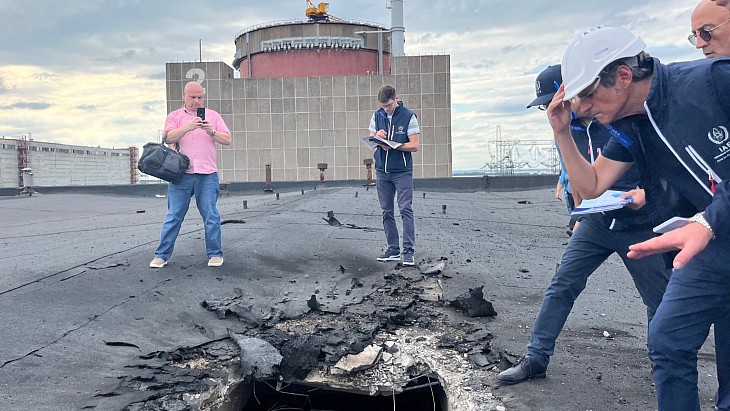The IAEA's report on the situation says: "While the ongoing shelling has not yet triggered a nuclear emergency, it continues to represent a constant threat to nuclear safety and security with potential impact on critical safety functions that may lead to radiological consequences with great safety significance.
"The IAEA recommends that shelling on site and in its vicinity should be stopped immediately to avoid any further damages to the plant and associated facilities, for the safety of the operating staff and to maintain the physical integrity to support safe and secure operation. This requires agreement by all relevant parties to the establishment of a nuclear safety and security protection zone around the ZNPP."
It does not attribute blame for any of the shelling but adds: "The current situation is untenable and the best action to ensure the safety and security of Ukraine’s nuclear facilities and its people would be for this armed conflict to end now.
"Pending the end of the conflict and re-establishment of stable conditions there is an urgent need for interim measures to prevent a nuclear accident arising from physical damage caused by military means. This can be achieved by the immediate establishment of a nuclear safety and security protection zone. The IAEA is ready to start immediately the consultations leading to the urgent establishment of such a nuclear safety and security protection zone at ZNPP (Zaporizhzhia nuclear power plant)".
Addressing the United Nations Security Council meeting about the report, IAEA Director General Rafael Mariano Grossi said the zone would be limited "to the perimeter and the plant itself".
The report also sets out in detail a timeline of events at the plant, as well as listing the safety and security guidelines which have been broken.
The report says: "The situation in Ukraine is unprecedented. It is the first time a military conflict has occurred amid the facilities of a large, established nuclear power programme. A nuclear accident can have serious impacts within the country and beyond its borders, and the international community is relying on the IAEA to perform a rigorous assessment of the situation and to keep it informed with accurate and timely information."
"From the very beginning of the conflict, the IAEA has been monitoring the nuclear safety and security situation of Ukraine’s nuclear facilities ... now, vitally, through the ISAMZ (the expert mission) the IAEA has established a presence at the ZNPP which will be of paramount importance in helping to stabilise the situation. This should also enable the IAEA to monitor closely the situation at the site, and to receive direct, fast and reliable information. The ISAMZ experts will carry out detailed and continuous work to assess the physical damage to the plant’s facilities, determine the functionality of the main and back-up safety and security systems, and evaluate the staff’s working conditions, in addition to performing safeguards activities on the site," the report says.
It said that issues needing to be addressed include reinstating off-site power supply redundancy, urging both sides to commit to supporting logistical and supply chains for continued nuclear safety and security of the plant and re-establishing communitications, including internet access, between staff at the plant and the Ukrainian nuclear regulator SNRIU.
The report also says that "the emergency response functions should be drilled and exercised, and the emergency response facilities to support these functions be re-established" adding that the IAEA team "was informed by the Ukrainian plant staff and managers that the on-site emergency centre was not accessible to the plant staff for emergency response as it was occupied by the military authority". An alternative emergency centre had been established but it had shortcomings such as no independent power supply or ventilation system.
The IAEA report also says Ukrainian staff operating the plant under Russian military occupation "are under constant high stress and pressure, especially with the limited staff available. This is not sustainable and could lead to increased human error with implications for nuclear safety."
The recommendation is "that an appropriate work environment, including family support, for operating staff should be re-established".
Ukraine had told the IAEA that Russian nuclear specialists from Rosatom had been at the plant and "requested daily reports from plant management about 'confidential issues' on the functioning of the NPP, covering aspects related to administration and management, maintenance and repair activities, security and access control, and management of nuclear fuel, spent fuel and radioactive waste. The IAEA considers that the presence of Rosatom senior technical staff could lead to interference with the normal lines of operational command or authority and create potential frictions when it comes to decision-making."
The report says: "As the operator has the prime responsibility for nuclear safety and security, it should be able to fulfil its mission with clear lines of responsibilities and authorities."
During the visit "Ukrainian plant staff and managers informed the team that all safety systems for the ZNPP were in normal operation and that the physical protection system was operational" but a range of security and access control responsibilities had changed and "the team observed the presence of Russian military personnel, vehicles and equipment at various places at the ZNPP, including several military trucks on the ground floor of the Unit 1 and Unit 2 turbine halls."
"The IAEA recommends that the physical protection system should be operated as designed and licensed, and that the continued functioning of safety and security systems and operability of the systems and equipment at ZNPP be ensured. This requires the removal of vehicles from areas that could interfere with the operation of safety and security systems and equipment."
The report was presented by Grossi at the United Nations on Tuesday. Two members of the IAEA mission that arrived at the plant last Thursday remain on the site as part of what is said to be a permanent presence.








_94566.jpeg)






